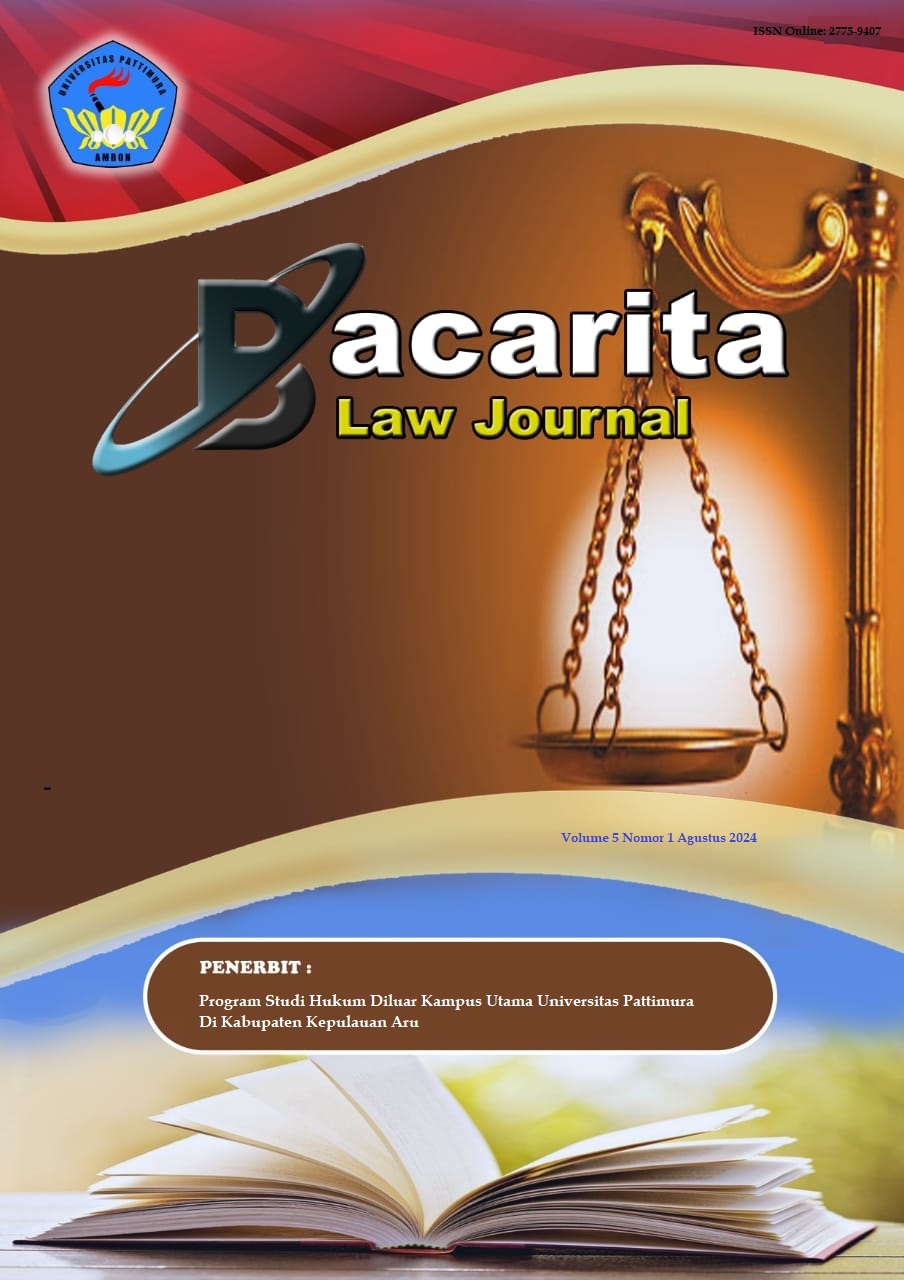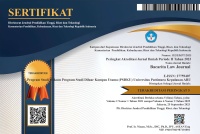Divergence of Financial Literacy Regulations and Imperatives: A Comparative Analysis of Indonesian and Malaysian Online Loans
Abstract
The study presents a comparative analysis of online lending regulatory models in Indonesia and Malaysia, highlighting the crucial challenges in balancing rapid financial inclusion with strong consumer protection in the digital age. This study uses qualitative-comparative and empirical legal analysis approaches. This methodology includes testing policy frameworks and analysis of regulatory documents from the Financial Services Authority (OJK), Bank Negara Malaysia (BNM), and Securities Commission Malaysia (SC). The empirical approach is based on findings from a financial literacy education program involving 30 participants in Indonesia, whose effectiveness was measured through pre-test and post-test. The results show that the inclusive model in Indonesia, despite successfully expanding access, is struggling to face the massive proliferation of OJK eradicating 2,930 illegal online loans that cause significant financial losses of 3.4 trillion and erode public trust. In contrast, a conservative and segmented approach in Malaysia, by explicitly banning peer-to-peer (P2P) lending to individuals and directing digital finance to productive sectors, has effectively prevented the problem of widespread illegal lending. In conclusion, regulatory philosophy strongly shapes market outcomes and systemic risks. It emphasizes that proactive and preventive regulatory design is more effective than reactive law enforcement. As a suggestion, it is recommended that the development of a holistic regulatory strategy and the improvement of financial literacy be a national priority for Indonesia, as well as maintaining a conservative approach that has proven successful in Malaysia.
Downloads
References
Capital Markets Malaysia. “Peer-to-Peer (P2P) Financing.” https://www.capitalmarketsmalaysia.com/digital-peer-to-peer-p2p-financing, 2025.
Fadiyah, Nur, and Heri Widodo. “Financial Technology and Literacy Shaping Students’ Financial Management with Digital Literacy.” Indonesian Journal of Law and Economics Review 19 (September 2024). https://doi.org/10.21070/ijler.v19i4.1160.
Gia, Thinh Hoang, Dau Hoang, and Kem Hoang. “Financial Inclusion Through Fintech: Bridging the Gap for the Unbanked,” 2024.
Hasanah, Nor, M Noor Sayuti, and Lisnawati Lisnawati. “Optimalisasi Regulasi Perbankan Syariah Oleh Bank Indonesia Dan Otoritas Jasa Keuangan Dalam Akselerasi Transformasi Digital.” Jurnal Manajemen Terapan Dan Keuangan 13, no. 03 (2024): 709–23.
Ilias, Ilyana, and Nurul Afifah Adawiyah Rafie. “Debt Trap or Financial Freedom? Unmasking Responsible Lending in Malaysia’s Non-Bank Credit Sector.” International Journal Of Research And Innovation In Social Science (IJRISS), July 2025. https://doi.org/10.47772/IJRISS.
Kaiser, Tim, and Annamaria Lusardi. “Financial Literacy and Financial Education: An Overview,” 2024.
Khiba, Fahlevy, and Sri Ady. “Financial Literacy, Risk Perceptions, and Consumptive Behavior on Interest in Using Online Loans.” Journal Of Economics, Finance And Management Studies 6, no. 7 (2023). https://doi.org/10.47191/jefms/v6-i11-07.
Kunaifi, Aang, and Fikri Zhilalil Haq. “Is Fintech Financing Failing the Faithful? Online Lending, Debt Culture, and Islamic Economic Principles.” EKSYAR: Ekonomi Syari’ah Dan Bisnis Islam (e-Journal) 12, no. 01 (2025): 21–33.
Patunru, Arianto, Mubariq Ahmad, Mursalim Nohong, Arifuddin Arifuddin, Anas Iswanto Anwar, Rakhmat Nurul Prima Nugraha, and Randi Kurniawan. Proceedings of the 8th International Conference on Accounting, Management, and Economics (ICAME 2023). Vol. 279. Springer Nature, 2024.
Pramitha, Adinda Indra Ayu, Andri Faizal Priyanto, Alfa Hamim Himawan, and Ferry Irawan. “Analisis Keadilan Kebijakan Insentif Pajak Kepada UMKM Di Era Pandemi Covid 19: Perspektif Keadilan Hukum.” Journal of Law, Administration, and Social Science 3, no. 1 (2023). https://doi.org/10.54957/jolas.v3i1.451.
Purwoto, Lukas, Christina Heti Tri Rahmawati, Trisnawati Rahayu, and Eustachius Arlo Swami Abhedananda. “Digital Financial Literacy and Entrepreneurial Resilience of Women Entrepreneurs: A Moderated Model of Overconfidence.” Journal of Women’s Entrepreneurship and Education 25, no. 12 (2025): 1–25. https://doi.org/10.28934/jwee25.12.pp1-25.
Riyanto, Fery, Nanda Purusa, Fakhmi Zakaria, and Ekarat Chaichotchuang. “Behavioral Factors Determining Interest in Using Online Loans Generation Z: A Study in Indonesia.” Jurnal Penelitian Ekonomi Dan Bisnis 10, no. 1 (2025): 55–65. https://doi.org/10.33633/jpeb.v10i1.12147.
Sanusi, Anuar, and Ita Fionita. “The Effect of Financial Literacy on the Online Loan Users’ Behavior (Danabijak) through Financial Attitude as an Intervening Variable.” International Journal of Economics, Business, and Entrepreneurship 6, no. 2 (2023): 131–39.
Sri Wahyuni, Mirra, Dinal Eka Pertiwi, and Meiffa Herfianti. “Peran Lembaga Keuangan Bank Dan Lembaga Keuangan Bukan Bank Dalam Memberikan Distribusi Keadilan Bagi Masyarakat.” Jurnal Akuntansi, Keuangan Dan Teknologi Informasi Akuntansi 5, no. 2 (2024). https://doi.org/10.36085/jakta.v5i2.7563.
Uthaileang, Wasan, and Supaporn Kiattisin. “Developing the Capability of Digital Financial Literacy in Developing Countries: A Case of Online Loan for Small Entrepreneurs.” Heliyon 9 (2023): e21961. https://doi.org/10.1016/j.heliyon.2023.e21961.
Zakaria, Fakhmi, Ifnu Alfaturachman, Dandy Aprilya, Salsa Salim, and Aulia Hidayah. “Role Of Generation Z’s Decision-Making In Online Loans And Ease Of Use As A Moderator Among University Students.” Maker: Jurnal Manajemen 11, no. 1 (2025): 65–76. https://doi.org/10.37403/mjm.v11i1.796.
Copyright (c) 2025 Andi Santri Syamsuri, Afdhal Afdhal

This work is licensed under a Creative Commons Attribution-NonCommercial 4.0 International License.
Authors who publish their manuscripts in this Journal agree to the following conditions:
- The copyright in each article belongs to the author, as well as the right to patent.
- Authors are able to enter into separate, additional contractual arrangements for the non-exclusive distribution of the journal's published version of the work (e.g., post it to an institutional repository or publish it in a book), with an acknowledgment of its initial publication in this journal.
- Authors are permitted and encouraged to post their work online (e.g., in institutional repositories or on their website) prior to and during the submission process, as it can lead to productive exchanges, as well as earlier and greater citation of published work.
- Authors have the right to self-archiving of the article (Author Self-Archiving Policy)















